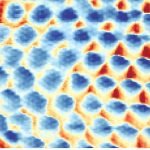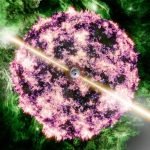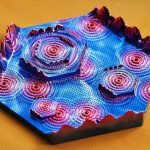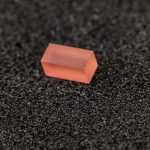Scientists unravel the mysteries of an ancient galaxy
In a remarkable discovery last September, the James Webb Space Telescope (JWST) uncovered an ancient, massive galaxy named JWST-ER1g.
This galaxy, found to have formed...
New study unlocks the mysteries of electron crystals
Electrons, those tiny particles that whirl around the center of atoms, have been studied by scientists for over a hundred years.
Yet, they still hold...
The brightest gamma ray burst ever seen came from a collapsing star
After a journey lasting about two billion years, photons from an extremely energetic gamma-ray burst (GRB) struck the sensors on the Neil Gehrels Swift...
Exploring the new frontier of quantum behavior in arsenic
Scientists have made a groundbreaking discovery in the world of quantum physics and materials science, unveiling a novel quantum phenomenon called "hybrid topology" in...
Scientists break new ground in gravitational wave detection
The hunt for gravitational waves, ripples in the fabric of spacetime, has opened a new window onto the cosmos, offering insights from the collision...
The hunt for dark matter takes a creative turn
Imagine trying to find something that you know is there but can't see, touch, or hear.
That's the challenge scientists face with dark matter, a...
Concentrating ultra-powerful lasers to a single color
Ultra-intense, ultra-short lasers are like the superheroes of the science world, wielding the power to unlock mysteries in physics, improve national security, revolutionize industry...
Scientists discover new quantum materials with unique properties
In recent years, scientists have been on a quest to discover new materials that act in surprising and useful ways.
These aren't your everyday materials;...
Untangling the quantum future: the path to a secure internet
Imagine a future where our internet is not just faster, but fundamentally more secure, thanks to the principles of quantum physics.
This isn't a distant...
Scientists detect quantum Barkhausen noise for the first time
Iron screws and other so-called ferromagnetic materials are made up of atoms with electrons that act like little magnets.
Normally, the orientations of the magnets...










